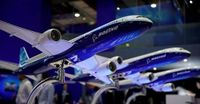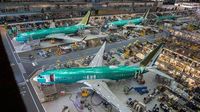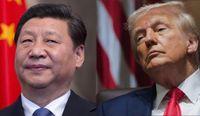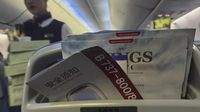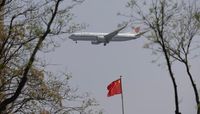In a significant escalation of the ongoing trade war between the United States and China, Chinese airlines have begun returning Boeing aircraft to the U.S., with a Boeing 737 Max landing in Seattle on April 19, 2025. This move comes in response to the recent imposition of a staggering 145% tariff on Chinese imports by the Trump administration, which has prompted Beijing to retaliate with its own tariffs.
The Chinese government has ordered its airlines not to accept further deliveries of Boeing aircraft, marking a clear stance against what it perceives as unfair trade practices. This decision also includes the recall of three 737 Max 8 aircraft that were in the final stages of preparation at the Boeing center in Zhoushan, intended for two Chinese airlines. The ramifications of this trade conflict are profound, as the U.S. exported nearly $12 billion in aircraft, spacecraft, and components to China in 2024, while importing virtually nothing in the aviation sector.
According to reports from Fox News and Reuters, the aircraft that returned to Seattle was painted in the livery of Xiamen Airlines, highlighting the direct impact on Chinese carriers that had expected to expand their fleets with Boeing jets. The market value of a single 737 Max can exceed $55 million, and the tariffs imposed by China would push the cost to well over $100 million, making such acquisitions financially untenable for Chinese airlines.
In a statement reflecting China's firm opposition to the U.S. tariffs, a spokesperson from the Ministry of Commerce remarked, "Appeasement will not bring peace, and compromises will not be honored." This sentiment underscores China's determination to resist what it views as unilateral economic bullying by the United States.
As the trade war intensifies, the implications for both nations are significant. Experts warn that if China continues to block purchases from Boeing, it could adversely affect the competitiveness of its own aircraft manufacturer, Comac, which has received substantial investment from the Chinese government aimed at developing alternatives to Boeing and Airbus aircraft.
Historically, Boeing has been a leading exporter to China, accounting for nearly a quarter of its deliveries to the country. However, with the rise of domestic competitors like Comac, which is still reliant on American technology, the landscape of global aviation is shifting. The C919 model from Comac, for instance, utilizes critical technology provided by U.S. companies such as GE Aerospace and Honeywell.
Moreover, the ongoing tension has led to increased scrutiny of trade agreements involving other nations. For instance, the South Korean government is sending its Trade and Finance Ministers, Choi Sang Mok and Ahn Duk-geun, to Washington to negotiate with U.S. officials. They aim to address the potential impact of U.S. tariffs on South Korean exports, particularly in sectors like electronics and automotive manufacturing, where companies like Samsung and Hyundai could face significant challenges.
In the financial markets, the reaction to these developments has been palpable. The Tokyo Stock Exchange closed down 1.30% as investors reacted to the strengthening of the yen against the dollar, which reached 141.30. Meanwhile, the Shanghai Composite index saw a modest increase of 0.45%, closing at 3,291.43 points, as markets adjusted to the ongoing trade uncertainties.
As the situation evolves, the U.S. administration's approach remains a focal point of concern. President Trump has expressed confidence in negotiating a resolution to the trade disputes, stating, "We are in talks with China on tariffs and I am hopeful for a deal." However, Beijing has remained steadfast in its opposition to any agreements that would compromise its economic interests.
Furthermore, as the conflict continues, China has also raised alarms about other countries forming trade agreements with the United States that may undermine its position. The Ministry of Commerce warned that such actions would not be tolerated, indicating potential countermeasures against nations that engage in what it perceives as detrimental agreements.
The escalating trade tensions have also sparked discussions around the safety and reliability of air travel in China. With the potential for disrupted supply chains, including the delivery of spare parts for Boeing aircraft, concerns have been raised about the overall safety of the aviation industry in the region.
As both nations navigate these turbulent waters, the future of international trade hangs in the balance. With China projected to account for approximately 20% of global aircraft demand in the next two decades, the stakes are high for both Boeing and its Chinese competitors.
In conclusion, the unfolding saga of the U.S.-China trade war, marked by the recent return of Boeing aircraft to the U.S., illustrates the complexities and far-reaching consequences of tariff policies. As negotiations continue and both sides prepare for potential retaliatory measures, the global aviation market and economic landscape remain under significant strain.
